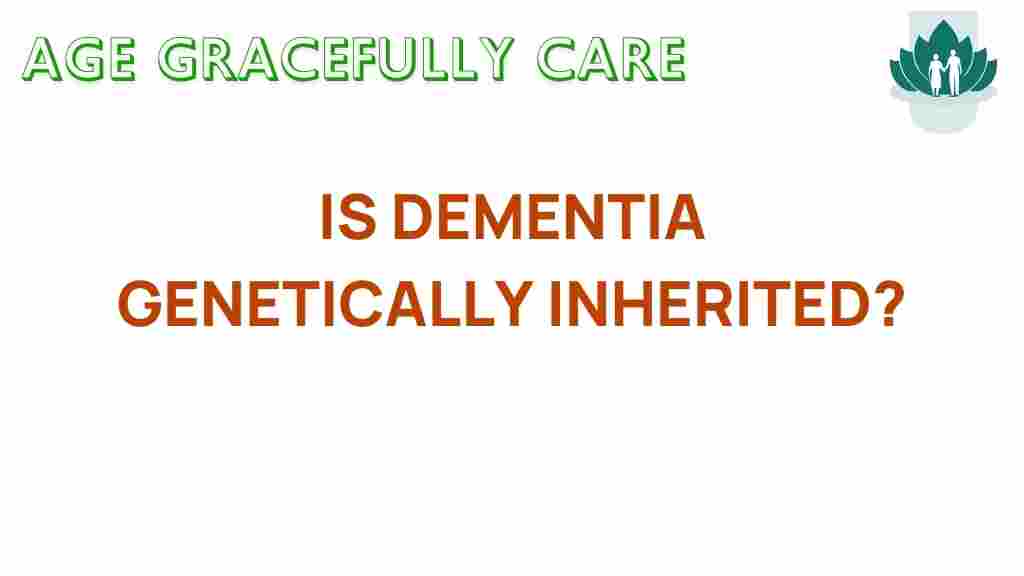Unraveling the Genetic Tapestry: Is Dementia Inherited?
Dementia is a term that encompasses a range of cognitive decline disorders, including Alzheimer’s disease, which significantly impacts memory, thinking, and social abilities. As our understanding of neurodegenerative diseases deepens, many people are left wondering about the role of genetics in these conditions. Is dementia inherited? Can family history increase the risk of developing dementia? In this article, we will explore the connection between genetics and dementia, focusing on inheritance patterns, risk factors, and current research findings.
The Genetics of Dementia
Genetics plays a crucial role in various health conditions, including dementia. Understanding how genetic factors contribute to the risk of developing dementia is essential for individuals concerned about their cognitive health.
- Genetic Influence: Certain genes have been identified that increase the risk of developing Alzheimer’s and other forms of dementia.
- Family History: Individuals with a family history of dementia are at a higher risk, suggesting a hereditary component.
- Inheritance Patterns: The way dementia genes are passed down can vary, making some forms of dementia more directly inherited than others.
Common Types of Dementia and Their Genetic Links
While there are many types of dementia, the most common forms include Alzheimer’s disease, vascular dementia, Lewy body dementia, and frontotemporal dementia. Each type has different genetic implications.
- Alzheimer’s Disease: This is the most prevalent form, with both early-onset (familial) and late-onset types. Early-onset Alzheimer’s is often linked to specific genetic mutations.
- Vascular Dementia: This type is related to blood flow issues in the brain and is less directly linked to genetics, though certain risk factors like hypertension can have genetic components.
- Frontotemporal Dementia: This type often has a stronger genetic basis, with mutations in specific genes like MAPT and GRN.
- Lewy Body Dementia: Genetic factors are less clear, but some studies suggest a potential hereditary risk.
Understanding Risk Factors Beyond Genetics
While genetics certainly plays a role in dementia risk, it is essential to consider other factors that contribute to cognitive decline. These include:
- Age: The risk of developing dementia increases significantly with age.
- Health Conditions: Conditions such as diabetes, hypertension, and heart disease can elevate dementia risk.
- Lifestyle Factors: Poor diet, lack of exercise, smoking, and excessive alcohol consumption can also contribute to cognitive decline.
- Environmental Factors: Exposure to toxins and pollutants may have an impact on brain health.
Research on Dementia and Genetics
Ongoing research continues to shed light on the complex relationship between genetics and dementia. Here are some key findings:
- APOE Gene: The APOE ε4 allele is a well-known genetic risk factor for late-onset Alzheimer’s disease. Individuals with one or two copies of this allele have an increased risk.
- Genome-Wide Association Studies (GWAS): Recent studies have identified numerous genetic loci associated with Alzheimer’s and other dementias, expanding our understanding of the genetic landscape.
- Direct-to-Consumer Genetic Testing: Many people now use genetic testing to assess their risk for dementia, although the implications of these results can be complex.
Step-by-Step Understanding of Dementia Inheritance
To unravel the complexities of dementia inheritance, consider these steps:
- Assess Family History: Begin by gathering information about your family’s cognitive health history. Look for patterns of dementia or cognitive decline.
- Consult a Healthcare Professional: If you have concerns about your genetic risk, speak with a healthcare provider or a genetic counselor for personalized advice.
- Understand Genetic Testing: If recommended, consider genetic testing to identify specific risk factors. Know that a positive result does not guarantee the development of dementia.
- Implement Preventative Measures: Focus on lifestyle changes that promote brain health, such as a balanced diet, regular exercise, and mental stimulation.
- Stay Informed: Keep up with the latest research and findings related to dementia and genetics to understand your risk better.
Troubleshooting Tips for Understanding Your Risk
Here are some troubleshooting tips to help you navigate the complexities of dementia and its genetic implications:
- Identify Symptoms Early: Be aware of early signs of cognitive decline, such as memory loss or confusion, and seek medical advice promptly.
- Engage in Cognitive Activities: Regularly challenge your brain with puzzles, reading, or learning new skills to help maintain cognitive function.
- Maintain Social Connections: Stay socially active to reduce the risk of cognitive decline; meaningful interactions can stimulate brain health.
- Monitor Health Conditions: Manage chronic health issues proactively, as they can influence dementia risk.
The Role of Family Support
Family support is essential for individuals concerned about dementia. Here’s how families can help:
- Open Communication: Discuss any concerns about cognitive health openly within the family.
- Shared Resources: Share information about dementia and its risk factors, helping everyone stay informed.
- Encouragement: Support each other in adopting healthier lifestyles that promote cognitive well-being.
Conclusion
Understanding the relationship between dementia, genetics, and inheritance is a crucial aspect of addressing cognitive decline. While genetic factors play a significant role, they are not the sole determinants of dementia. Family history, lifestyle choices, and overall health also contribute to one’s risk. By staying informed and taking proactive steps, individuals and families can navigate the complexities of dementia and potentially reduce their risk. For further reading on dementia research, you can visit the Alzheimer’s Association website for more in-depth resources. Remember, knowledge is power, and understanding your genetic background can help you make informed health decisions.
This article is in the category Health and created by AgeGracefullyCare Team
